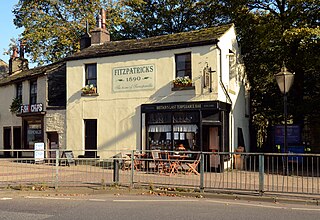A temperance movement is a social movement urging reduced or prohibited use of alcoholic beverages.
A temperance movement is a social movement urging reduced or prohibited use of alcoholic beverages.
Temperance movement may also refer to:

The temperance movement is a social movement promoting temperance or complete abstinence from consumption of alcoholic beverages. Participants in the movement typically criticize alcohol intoxication or promote teetotalism, and its leaders emphasize alcohol's negative effects on people's health, personalities and family lives. Typically the movement promotes alcohol education and it also demands the passage of new laws against the sale of alcohol, either regulations on the availability of alcohol, or the complete prohibition of it. During the 19th and early 20th centuries, the temperance movement became prominent in many countries, particularly in English-speaking, Scandinavian, and majority Protestant ones, and it eventually led to national prohibitions in Canada, Norway, Finland, and the United States, as well as provincial prohibition in India. A number of temperance organizations exist that promote temperance and teetotalism as a virtue.
The Woman's Christian Temperance Union (WCTU) is an international temperance organization. It was among the first organizations of women devoted to social reform with a program that "linked the religious and the secular through concerted and far-reaching reform strategies based on applied Christianity." It plays an influential role in the temperance movement. Originating among women in the United States Prohibition movement, the organization supported the 18th Amendment and was also influential in social reform issues that came to prominence in the progressive era.
Washingtonian may to refer to people from:
LTL may refer to:
White bear may refer to:
Phil Campbell may refer to:
KDRL may refer to:

A temperance bar, also known as an alcohol-free bar, sober bar, or dry bar, is a type of bar that does not serve alcoholic beverages. An alcohol-free bar can be a business establishment or located in a non-business environment or event, such as at a wedding. Alcohol-free bars typically serve non-alcoholic beverages, such as non-alcoholic cocktails known as mocktails, alcohol-free beer or low-alcohol beer, alcohol-free wine, juice, soft drinks and water. Popular temperance drinks include cream soda, dandelion and burdock, sarsaparilla, and Vimto, among others. Various foods may also be served.
Prohibition refers to the act of prohibiting a certain substance or act.
Eliza Stewart may refer to:
Sarah Robinson may refer to:
Martha Brown may refer to:
Temperance Hall may refer to:
Temperance Town may refer to:
Temperance may refer to:
Margaret Anderson may refer to:

In the United States, the temperance movement, which sought to curb the consumption of alcohol, had a large influence on American politics and American society in the nineteenth and twentieth centuries, culminating in the prohibition of alcohol, through the Eighteenth Amendment to the United States Constitution, from 1920 to 1933. There is some disagreement whether the policies were a 'failure' or whether they triggered an increase in organized crime, though that remains a commonly held belief. Several years after Prohibition policies were lifted, alcohol use remained significantly lower but eventually rose to pre-prohibition levels. Crimes that were associated with excessive drinking such as domestic abuse also saw a sharp decline during Prohibition. Alcohol consumption is much lower than it was in early 1900's.. Today, there are organizations that continue to promote the cause of temperance. The World Health Organization has noted that out of social problems created by the harmful use of alcohol, "crime and violence related to alcohol consumption" are likely the most significant issue.
The temperance movement in the United Kingdom was a social movement that campaigned against the recreational use and sale of alcohol, and promoted total abstinence (teetotalism). In the 19th century, high levels of alcohol consumption and drunkenness were seen by social reformers as a danger to society's wellbeing, leading to social issues such as poverty, child neglect, immorality and economic decline. Temperance societies began to be formed in the 1830s to campaign against alcohol. Specific groups were created over periods of time dedicated to the different aspects of drinking. For example, in 1847, the Band of Hope was created to persuade children not to start drinking alcohol. Most of these temperance groups were aimed at the working class. Temperance was also supported by some religious groups, particularly the Nonconformist Churches. Although the temperance movement met with local success in parts of Britain, it failed to impose national prohibition, and disappeared as a significant force following the Second World War.
The Temperance Movement are a British blues rock band formed in 2011 by Glasgow-born vocalist Phil Campbell and guitarists Luke Potashnick and Paul Sayer. The rhythm section consists of bassist Nick Fyffe and the Australian-born drummer Damon Wilson. The band released their Pride EP in 2012, and their eponymous debut studio album was released on 16 September 2013. Collectively the band have a rich history of experience, having previously played with Rooster, Ben's Brother, Jamiroquai, Ray Davies, The Waterboys and Feeder.
Edith Smith may refer to: